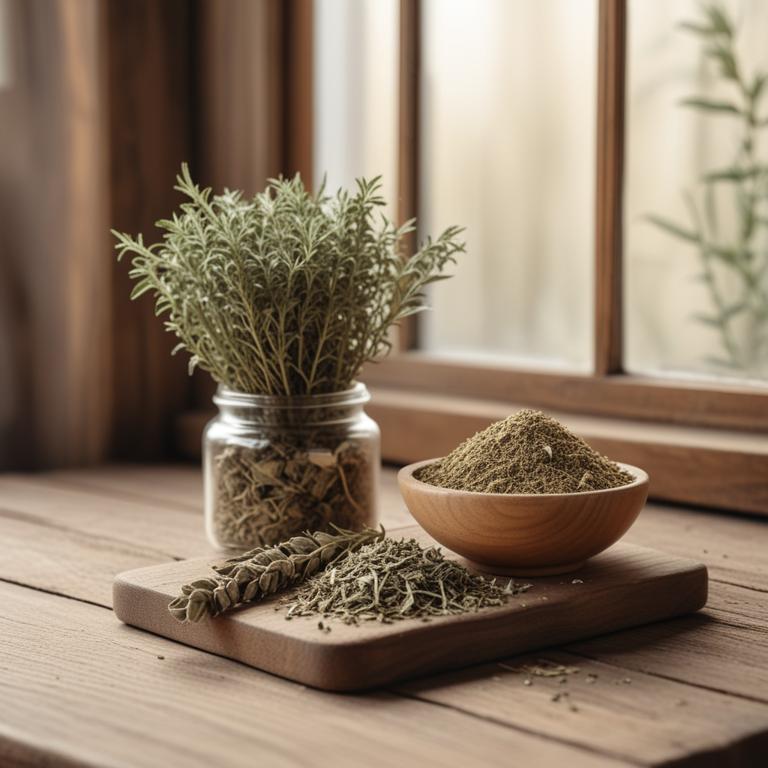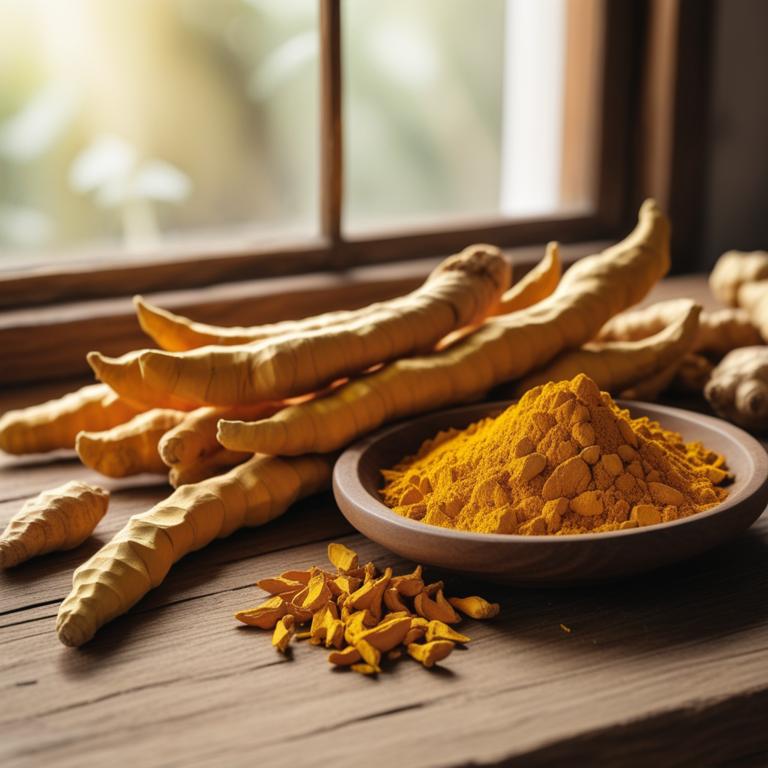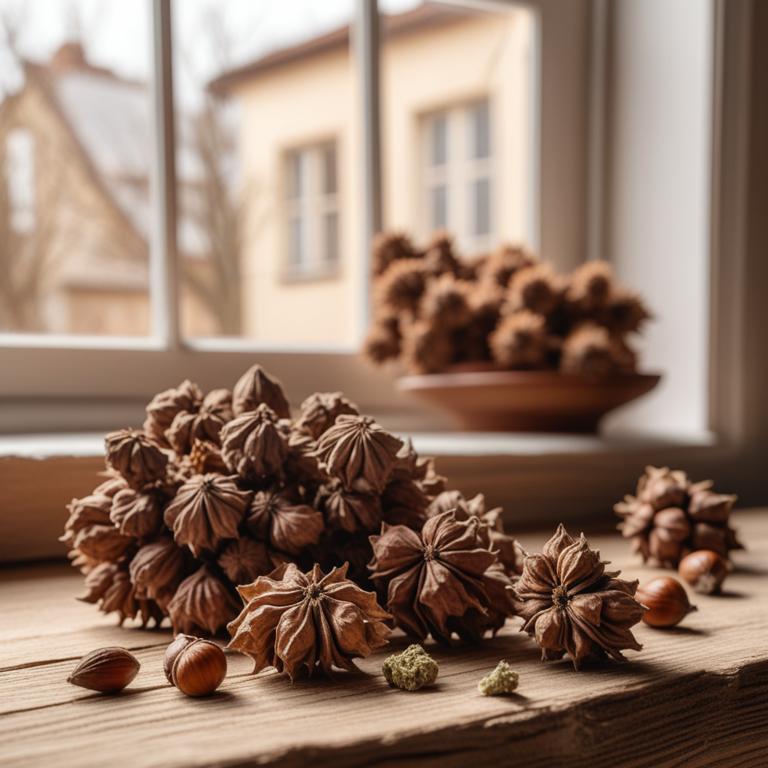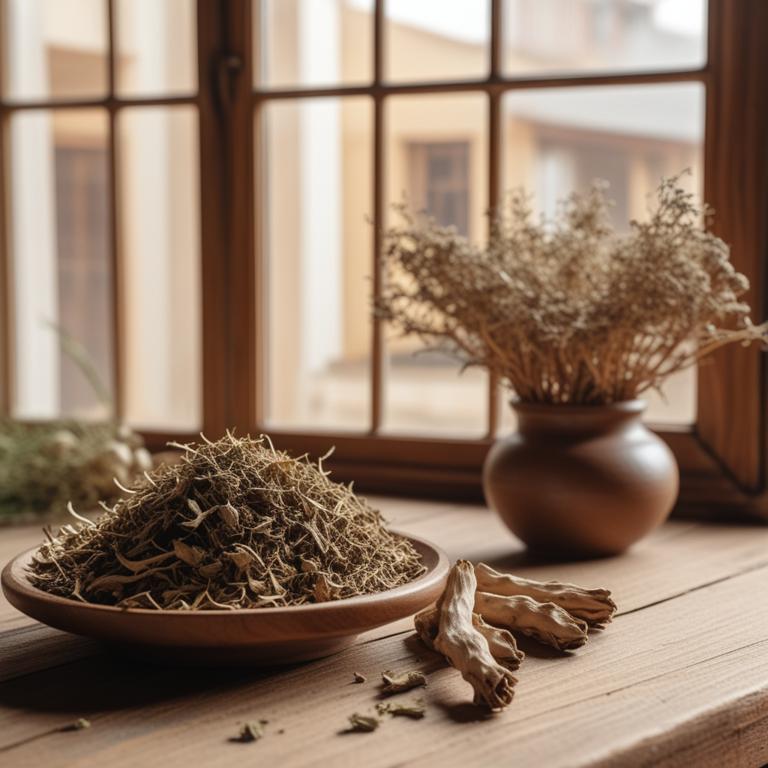Updated: Dec 1, 2024
Unlocking the Secrets of Difficulty Eating: Medicinal Herbs and Herbal Preparations for a Balanced Diet

Difficulty eating, also known as dysphagia, is when you struggle to swallow food, making mealtimes stressful and painful.
This can lead to weight loss, malnutrition, and feelings of isolation. The causes of difficulty eating can be varied, from a stroke or neurological disorder, to a throat or esophageal issue, or even a psychological condition like anxiety or depression. Fortunately, herbal remedies can offer relief from the discomfort and anxiety associated with difficulty eating. Herbs like slippery elm, marshmallow root, and licorice root have anti-inflammatory properties that can soothe and calm the throat and digestive tract, making swallowing easier.
These herbs can also help to reduce inflammation and irritation in the esophagus, allowing food to pass through more smoothly. Herbal preparations like teas and tinctures can be an effective way to harness the healing powers of these herbs. Slippery elm tea, for example, can be made by steeping dried slippery elm bark in hot water, while licorice root tea can be brewed by steeping dried licorice root in hot water. Tinctures can be taken sublingually, allowing the herbs to be absorbed quickly into the bloodstream.
Drinking herbal teas, like peppermint and ginger, before meals can also help to relax the muscles and improve digestion, making eating a more enjoyable experience.
Table of Contents
- What causes individuals to experience difficulty eating?
- What are the benefits of using herbs as a solution for difficulty eating?
- What are the major herbal remedies for difficulty eating?
- Which herbal supplements are used to address difficulty eating?
- What herbs should you be cautious with if you have difficulty eating?
- FAQ
What causes individuals to experience difficulty eating?
The main causes of difficulty eating are quite varied and can be quite distressing.
One of the main causes is Dysphagia, which is a condition where food gets stuck in the throat or esophagus while swallowing. This can be due to a stroke, a neurological disorder, or even surgery. The muscles and nerves that control swallowing can be damaged or weakened, making it hard for food to pass through. Another common cause of difficulty eating is Gastroesophageal Reflux Disease, or GERD for short. This is a condition where stomach acid flows back up into the esophagus, causing pain and discomfort. This can happen when the muscles between the esophagus and stomach don't work properly, or when the esophagus is irritated or inflamed.
Eating can be a challenge when the stomach is constantly sending acid into the esophagus. Oral Thrush, also known as candidiasis, is a fungal infection that can cause difficulty eating. This infection causes white patches to form in the mouth and throat, making it painful to eat or swallow. The infection can be caused by a weakened immune system, taking antibiotics, or using a mouthwash that kills off good bacteria. Lastly, eating disorders such as anorexia nervosa, bulimia nervosa, or binge eating disorder can cause significant difficulty eating. These disorders involve abnormal eating habits and can lead to malnutrition, dehydration, and even organ damage.
People with eating disorders may avoid eating altogether, eat too much in one sitting, or engage in purging behaviors to compensate for the food consumed.
What are the benefits of using herbs as a solution for difficulty eating?
When you're struggling to eat, using certain plants can help.
These plants have been used for centuries to ease digestive issues and make eating more comfortable. One of the main benefits is that they can help reduce inflammation in the digestive tract, which can be a major cause of discomfort. They can also help relax the muscles in your stomach and intestines, making it easier to digest food.
Some of these plants can even help stimulate your appetite, making it feel more enjoyable to eat. Additionally, they can help reduce nausea and vomiting, which can be a major obstacle when it comes to eating. They can also help ease bloating and cramping, making it feel more comfortable to eat and digest food.
Many people find that using these plants helps them feel more confident and in control when it comes to eating.
What are the major herbal remedies for difficulty eating?

When eating is difficult, herbs can be a big help.
Zingiber officinale, or ginger, is a good choice because it can calm the stomach and reduce nausea. This makes it easier to eat when you're feeling queasy. Glycyrrhiza glabra, or licorice root, has anti-inflammatory properties that can soothe the digestive tract and reduce swelling. This can be especially helpful when eating is painful or uncomfortable. Cinnamomum verum, or cinnamon, has a warm and comforting flavor that can help stimulate your appetite.
It also has anti-inflammatory properties that can help reduce swelling and pain in the digestive tract. Curcuma longa, or turmeric, contains a compound called curcumin, which has powerful anti-inflammatory and antioxidant properties. These can help reduce pain and inflammation in the digestive tract and make eating more comfortable. Foeniculum vulgare, or fennel, is a natural digestive aid that can help reduce bloating and gas. It can also help stimulate your appetite and make eating more enjoyable. When you combine these herbs, you get a powerful combination that can help make eating easier and more comfortable.
Ginger can help calm your stomach, licorice root can soothe your digestive tract, cinnamon can stimulate your appetite, turmeric can reduce pain and inflammation, and fennel can help with digestion and bloating.
Which herbal supplements are used to address difficulty eating?

When it's hard to eat, herbal preparations can be a big help.
A decoction is a liquid made from boiling herbs in water. This is good because it releases the active ingredients from the herbs, making them easy to digest. Decoctions are often used for issues like nausea and diarrhea. Herbal capsules are another option. They contain dried herbs that have been ground into a fine powder. This way, you can take the herbs in a controlled amount, which is helpful if you're feeling queasy. Capsules are also convenient because they're easy to swallow. Herbal teas are a popular choice. They're made by infusing herbs in hot water, creating a soothing drink.
Some herbs, like peppermint and ginger, can help calm the stomach and make eating easier. Herbal teas are also gentle on the digestive system. Herbal tinctures are liquid extracts of herbs. They're made by mixing herbs with a solvent, like alcohol or glycerin. Tinctures are good because they contain a high concentration of active ingredients, making them potent remedies. However, they can be strong, so it's essential to follow the instructions carefully. Lastly, herbal infusions are similar to teas, but they're made by steeping herbs in cold water. This is a good option for people who can't tolerate hot liquids. Infusions are often used for relaxing and calming the body, which can help with eating difficulties.
These herbal preparations can be a valuable addition to your self-care routine when it's hard to eat.
Additional Resources:
What herbs should you be cautious with if you have difficulty eating?
If you have trouble eating, you should be careful with certain herbs.
Taxus baccata, also known as yew, contains a toxic substance that can cause serious problems if ingested. It's not meant to be eaten, so it's best to avoid it altogether. Piper nigrum, or black pepper, is a common spice, but it can be irritating to the stomach and digestive system, making eating even harder. This can be especially problematic if you're already having trouble getting food down. Capsicum annuum, the plant that produces bell peppers and chili peppers, is known for being spicy.
While some people enjoy the heat, it can be overwhelming for those with sensitive stomachs. This can make eating even more uncomfortable, which is the last thing you need. Digitalis purpurea, also known as foxglove, contains a toxic substance that can affect your heart rate and blood pressure. Ingesting even small amounts can cause serious problems, making it essential to avoid eating it. Aconitum napellus, commonly known as monk's hood or wolf's bane, contains a toxic substance that can cause nausea, vomiting, and stomach pain if ingested.
This can be extremely uncomfortable and even lead to more serious health issues.
FAQ
Are there any specific herbs that can prevent difficulty eating?
Ginger and slippery elm are two herbs that may help with difficulty eating.
Ginger can ease digestive discomfort and reduce nausea, making it easier to swallow food.
Slippery elm, on the other hand, forms a protective barrier in the mouth and throat, helping to soothe irritated tissues and reduce inflammation.
Is it safe to use herbal remedies for difficulty eating during pregnancy?
While some women find herbal remedies helpful for eating difficulties during pregnancy, it's essential to be cautious.
Certain herbs can interact with other substances or affect the baby's health.
If you're considering trying herbal remedies, research them carefully and choose products from trusted manufacturers to minimize potential risks.
Are there any herbs that can reduce the frequency of difficulty eating?
Ginger has been known to help with eating difficulties.
It can ease digestive issues and calm stomach problems. Peppermint oil may also help when eaten or taken as a tea.
Both herbs can make it easier to digest food and reduce discomfort, which can make eating less of a challenge.
Can i combine different herbal remedies for difficulty eating?
You can combine different herbal remedies for difficulty eating, but be cautious.
Some herbs can interact with each other or with medications. For example, combining ginger with peppermint may help soothe digestive issues, while licorice root may enhance ginger's effects.
However, start with small amounts and observe how your body reacts.
Related Articles

Stomach Cramps: Effective Herbal Preparations and Medicinal Plants

Understanding Gastritis: Causes and Natural Relief with Medicinal Herbs

Difficulty Swallowing: Causes, Remedies, and Medicinal Herb Options

Constipation Prevention and Treatment with Herbal Preparations

Gas in Stomach Causes, Symptoms, and Natural Herbal Remedies for Relief






